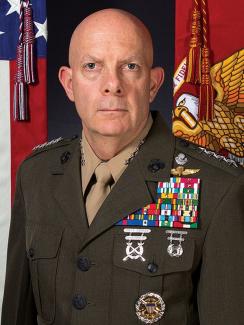When Gen. David Berger (E ’81) first entered the NROTC at Tulane, he didn’t know much about the program or the military. However, the years he spent in Tulane’s NROTC unit, he describes today as “formative,” crediting those years as a starting point for him.
“The foundation underneath, I think it stays with you,” Berger said. “I definitely would not be here without what they provided me there.”
Since the first graduates of the NROTC in 1941, more than 2,000 Naval and Marine officers have been commissioned from Tulane, including Berger, who was first commissioned as an infantry officer in 1981, the same year he graduated.
Since July, his most recent role is serving as the 38th commandant of the U.S. Marine Corps. He was nominated for the role by President Donald Trump in March and was confirmed by the Senate in June. He took office July 11, replacing Gen. Robert Neller, who had served as commandant since 2015.
As leader of the Corps, one of his biggest responsibilities will be strengthening national security strategies, he said. He also plans to make sure the Corps and the Navy are “viewed as a single force for the nation,” and to improve the level of Marine training.































































